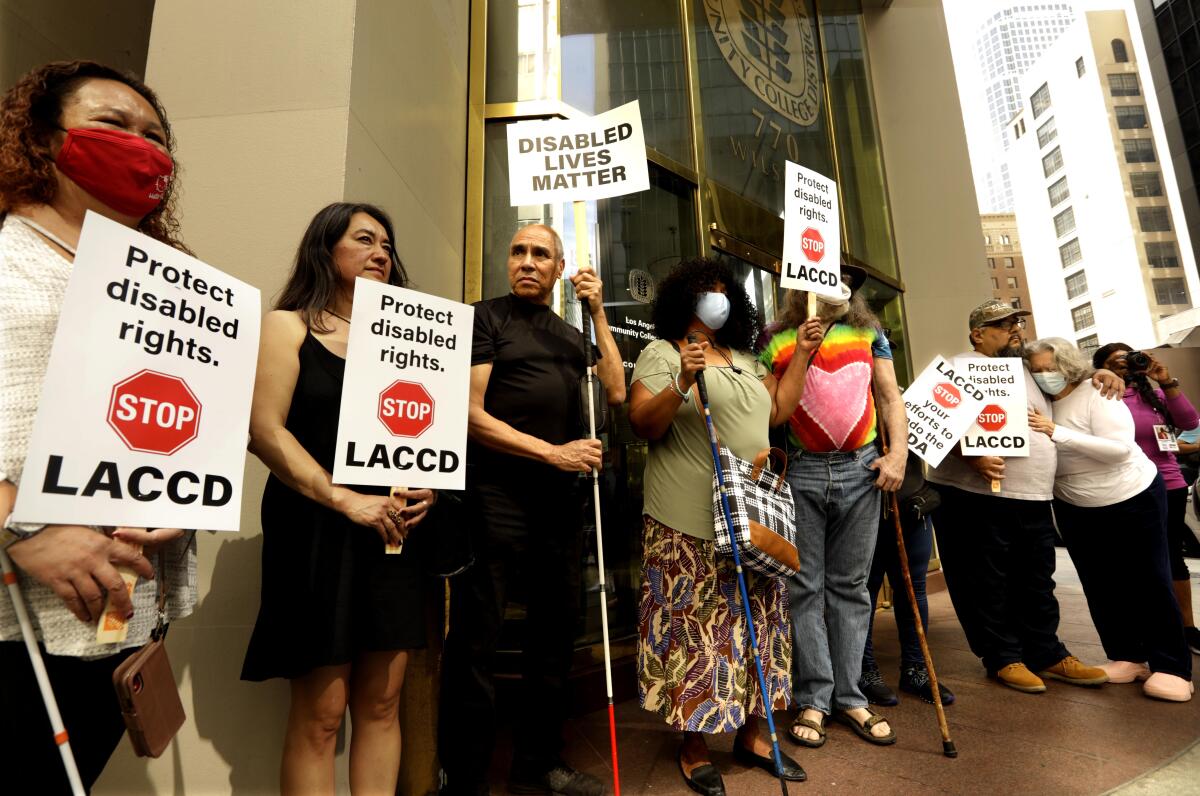Community college district won’t take disability case to Supreme Court following protests

- Share via
Responding to intense protests from the disability community, the Los Angeles Community College District’s Board of Trustees has backed down from appealing to the U.S. Supreme Court over a lawsuit filed by two blind students claiming they were denied equal access to education.
During a closed session meeting Wednesday night, the board voted unanimously ahead of a deadline to direct its lawyers to refrain from appealing to the high court over the 2017 lawsuit and to continue instead with mediation. The suit alleged discrimination of two students’ civil rights after the district failed to properly help them with accommodations to which they are legally entitled.
The case boiled down to a question over whether unintentional discrimination — a lack of accommodation, for example, that inadvertently hinders a person — is a violation of federal law. Though two courts said it was, the district argued the opposite and questioned the legal reasoning behind the suit.
Mediation will continue until March 14, LACCD said, to discuss a settlement agreement that would be presented at an April board meeting. If the talks fail, it’s possible that the matter may go back to the U.S. District Court for a retrial.
“We understand and support the importance of the [Americans with Disabilities Act] and agree completely with all of the people who took the time during the past several months to share with us their thoughts and feelings. Their strong, heart-felt beliefs resonate with us and it is our desire to bring quick closure to the case,” Trustee David Vela said in a statement.
The plaintiffs won twice in federal court. A 9th Circuit appeals panel said the lack of equal access to a college education, though unintentional, violated the students’ civil rights. But one dissenting judge on the panel sided with LACCD that unintentional discrimination is not a violation of the Americans with Disabilities Act or Section 504 of the Rehabilitation Act, the civil rights law that prohibits discrimination on the basis of disability. LACCD considered taking the case to the Supreme Court to decide the matter.
The trustees’ closed-session vote followed a last-ditch effort to stop the board from going forward with a case that advocates feared could weaken disability protections across the country if the conservative-leaning court took it up.
Dozens of protesters, led by plaintiffs Roy Payan and Portia Mason, demonstrated outside LACCD headquarters during Wednesday’s board meeting before streaming inside during public comment. For nearly three hours, protesters who are blind, wheelchair users, LACCD staff, parents of disabled children and advocates of the disability community addressed the board in-person and virtually.
“I don’t want favoritism — I want the system to work,” said Payan, who was first to address the board. Payan, who went blind in adulthood, is now working on his doctorate degree in public administration at USC after graduating from Cal State L.A.
The crowd expressed immense fear over the possibility of the case moving forward, and anger that elected officials were not listening to constituents on a matter they said could be a precedent-setting blow to the disability community.
“There is a solution to every problem that you all are throwing up, other than to try to trash our civil rights in the Supreme Court,” said Claudia Center, legal director of the Disability Rights & Education Fund.
Advocate Jennifer Keelan-Chaffins, who at the age of 8 participated in the “Capitol Crawl — a 1990 demonstration at which dozens cast aside wheelchairs and mobility aids to crawled up the steps of the U.S. Capitol ahead of the signing of the ADA — made an impassioned plea to the board to refrain from going forward.
“It would have eviscerating effects on the ADA and its true purpose, with negative consequences that would reach across the country in regards to education, housing, employment for people with disabilities,” Keelan-Chaffins said. “I am demanding that the board of trustees stop their efforts to undermine the ADA and Section 504 protections. I did the Capitol Crawl to represent my generation and future generations of kids with disabilities and if you continue down this path, you will be putting a barrier in our way.”
More than 10,000 people also signed a petition in support of the plaintiffs and lawmakers, as well as Lt. Gov. Eleni Kounalakis, called on board members to reject an appeal.
Payan, 64, and Mason, 52, first sued the district in 2017 after it failed to accommodate them with accessible reading materials, note-taking assistance and software needed for their studies. They said the lack of accommodations forced them to choose between dropping a class or tanking their grade point averages.
Mason, who lost her eyesight as a teenager, is still a student at Los Angeles City College and said that she continues to face obstacles. This week, she said she had to drop a class after the college failed to get her the reading material accommodations she needed, weeks after the class had begun. She said that type of discouragement can prompt some to give up and drop out.
“If you discourage people from being educated, you’re almost certainly keeping them at a dependent, isolated place.
More to Read
Sign up for Essential California
The most important California stories and recommendations in your inbox every morning.
You may occasionally receive promotional content from the Los Angeles Times.














